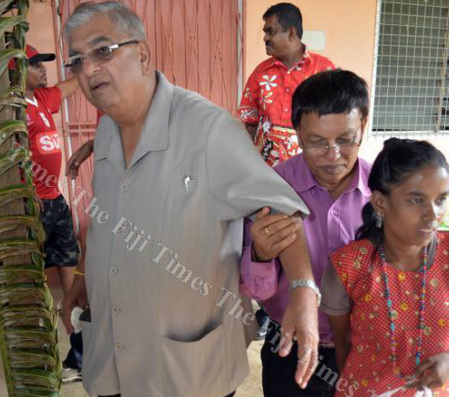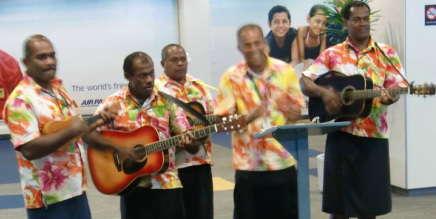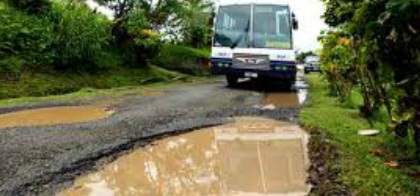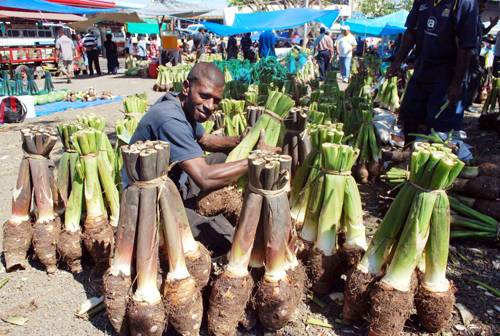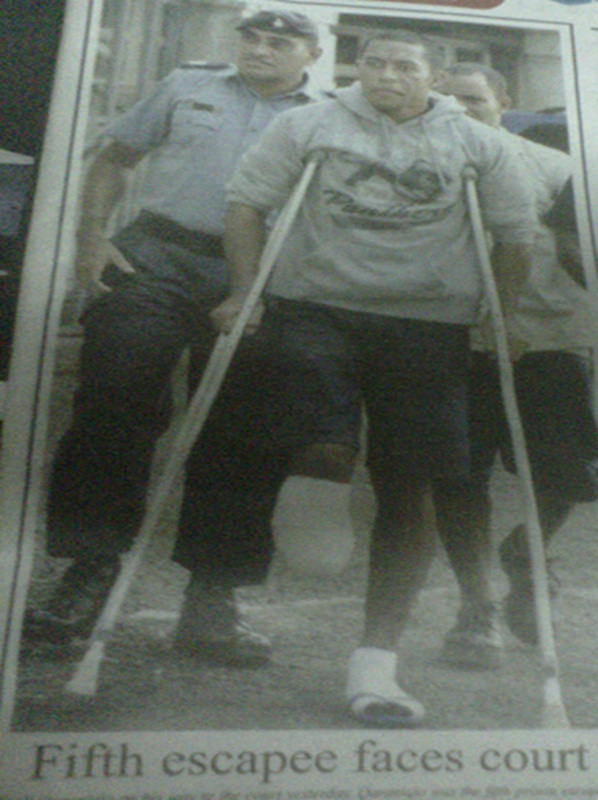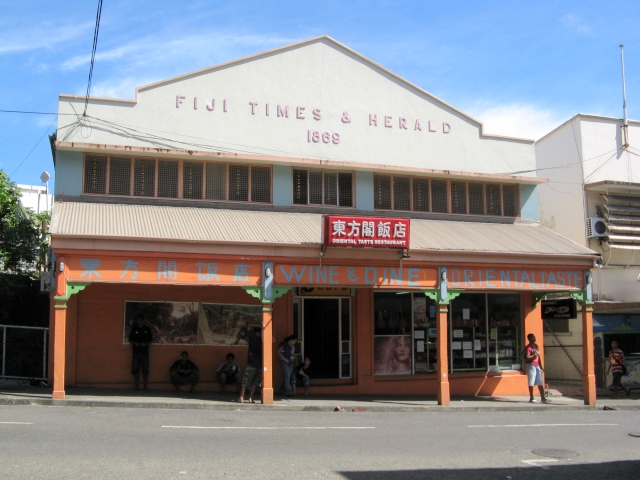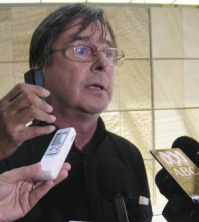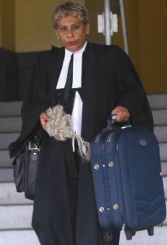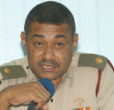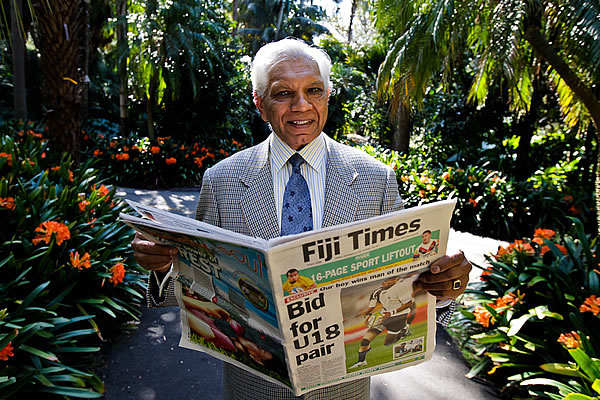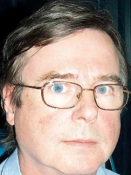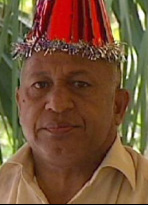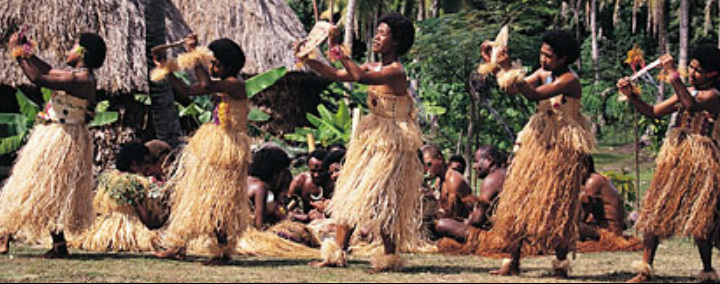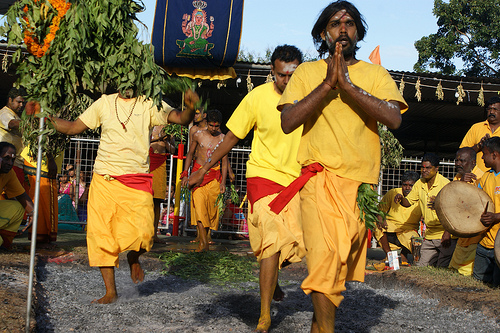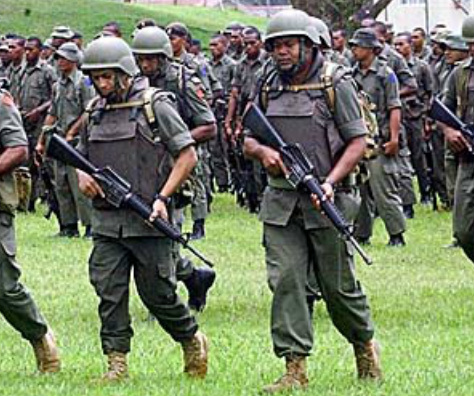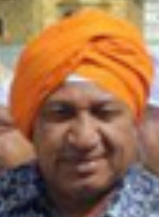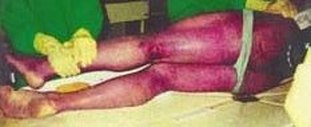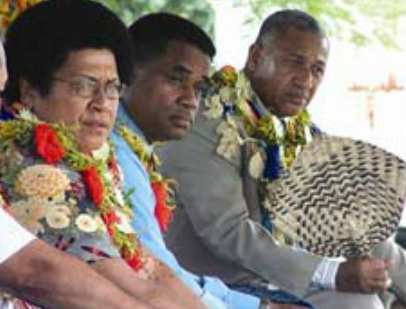By RUSSELL HUNTER
|
Certainly none voted for his favoured party while overseas voting patterns strongly indicate the soldiers’ support for the SDL. Since then, of course, the troops have enjoyed generous pay rises but Fiji will probably never know if it’s enough to buy their votes.
Bainimarama has thumbed his nose at the international community, the European Union, the Commonwealth, the IMF and the world’s labour unions. He thinks he is using the Pacific Forum, especially its Melanesian Spearhead Group, but is in fact used by them while at home his frequent travels, often with a large retinue of family and hangers-on, as well as his constant need for a heavily armed bodyguard team are subjects of much tanoa talk. But it will take more than talk to dislodge Bainimarama. “It’s the economy stupid” has become a clichéd quotation but in Bainimarama’s case it’s one to which he ought to pay close attention. For it is more likely than any talk of election to cause his downfall. He’s going to run out of money. Under Bainimarama’s ministership, the sugar industry is in its death throes. The Fiji Sugar Corporation is all but insolvent, depending on the regime for its day to day survival. The $80 a tonne payout will barely keep farmers on the land and even that would have had to be borrowed, most likely from the long suffering FNPF though in the presence of yet another broken pledge – transparency – it’s not possible to be certain. What is sure is that the FSC didn’t have the money. Again under the Bainimarama ministry sugar production has halved. Buyers are turning away and part of last year’s production is still unsold. Propaganda will not save the sugar industry. But Bainimarama’s performance as finance minister is if anything worse. His pledge to slash government borrowing has become a subject of gallows humour as government debt has ballooned in an orgy of borrowing – mostly from China – to fund his ramshackle regime and to keep the squaddies loyal. Again, in the new “transparent” Fiji it’s impossible to be certain of government liabilities but there seems little doubt that state debt as well guarantees of loans by government entities has tripled since 2006. Estimates vary between $5.5 billion and $7+ billion – but even the lower end of the range is a chilling indictment of Bainimarama’s mishandling of a national economy cruelly exposed to world economic conditions. Any downturn will hammer Fiji while an upturn will take time to assist, in however small a way, its import-dominated economy. Meanwhile China seems to have lost much of its appetite for Fiji debt while the new regime seems more likely to place its relationship with Australia much higher than its interest in Fiji. Fiji’s economy is also exposed to action by the world labour movement – action that draws closer by the day. Any concerted effort would mean disaster for Bainimarama and blaming it all on Australia won’t help him. He is in effect cornered if that happens. He can’t go back on the trade union decrees and he can’t survive a prolonged effort by the world’s labour organisations. Quite what he or world labour will do remains to be seen. He’s been praying, of course for a change of government in Australia, and his prayers will be answered in September when the Labour government of Julia Gillard (or possibly Kevin Rudd) is removed. But that’s probably as far as it will go. The most likely new foreign minister, Julie Bishop, has talked of re-engagement with Fiji (just as Bob Carr tried to to) but there is as yet no evidence of any intention to overturn policy. And that’s because the very existence of the Bainimarama regime flies in the face of what most Australians, Labour or Liberal, hold dear – democracy, human rights and a fair go for all. Ms Bishop will find it difficult to sell any policy that goes against those group feelings. Indeed she may find it more practical to steer well clear of the issue. For all of those reasons and more 2014 will be a stern test for Voreqe Bainimarama. While his almost certain failure of that test won’t end his regime it will further erode his standing at home and abroad. And with his bag of political capital all but empty he can’t afford that. [email protected] |
By PROFESSOR BIMAN PRASAD |
The future of the Sanatan Dharam Prithinidhi Sabha looks grim. The organization led by Mr. Dewan Maharaj and his Secretary, Mr. Vijendra Prakash have managed to implement a new Constitution which has several undemocratic provisions. The election held on Sunday to elect the office bearers other than the President cannot be said to be fair and transparent. The General Secretary, Mr. Vijendra Prakash, who was contesting the election, was involved in the so called sorting/counting out of the votes. Where are the moral and ethical standards of these officials who preach publicly about moral and ethical standards?
To add insult to injury to all the Sanatani’s in Fiji, a man who is currently before the court for presenting false transfer documents to transfer a temple property belonging to Shree Sanatan Dharam Nasea Ramayan Mandali to the Sanatan Dharam Pratinidhi Sabha of Fiji, has been elected National President. If he was a person with principles, he should have stood aside and let one of the senior Vice Presidents like Mr. Ashok Balgovind to act as President until his court case is resolved. The trustees of the organization must act now and ask all the national officials to stand aside until an independent investigation is carried out on all the activities of the Sabha, its elections, its finances, processes and procedures. If the investigation shows irregularities in any aspect of the organization, especially in the process of adopting the new Constitution of the Sabha, the finances and the conduct of the elections, the office bearers should all be asked to resign and a fresh election be called. In fact they should hand over the leadership to the Trustees, after the failed convention. This would have saved the Sabha from further disunity and fragmentation. The current leadership has presided over a most disunited organization since its inception. If the largest Hindu organisation in Fiji begins to put its leadership into the hands of a person who is currently before the court, and allows it to be run by unconstitutional, unethical and unclear means, it is unlikely to serve its members effectively." Fijileaks Editor: The view expressed in this article does not reflect in anyway the view of Professor Prasad's employer, the University of the South Pacific. |
By RUSSELL HUNTER
|
It’s worth remembering that the squaddies no longer swear an oath of allegiance to the nation – they pledge allegiance only to their leader. And he has repaid them well but must keep on repaying. But this is where the game has changed. Nobody outside the regime ever believed its propaganda but in the past most would shrug and get on with their lives as best they could. But the strength and unity of the submissions to the Ghai commission have shown them they are not alone. Far from it – they now see that they comprise an overwhelming majority. Of the 7000 submissions how many supported the “non-negotiables”? So far a few of the single-issue activists who clung to the dictator’s coat tails, having realised they were seen as no more than useful idiots, have let go. But there are signs that the process is accelerating. Former coup cheerleaders such as Penni Moore, Akuila Yabaki and Prue Rouse, for example, are beginning to make disapproving noises. Maybe they have sensed a changing wind, perhaps their consciences have caught up with them or maybe a combination of the two is driving them. But all landslides begin with the movement of a few. The regime, meanwhile, is clearly rattled. With a cowed media, all forms of dissent crushed by the military and a refusal to hear outside voices, the junta has long conducted a dialogue with itself to the point at which some had even begun to believe their own publicity. So the weight of submissions to the Ghai commission (transmitted daily to the Boss by a spy within) came as a shock. Rattled, it is, but by no means beaten. It still has the guns and the will to use them. The alternative of a life sentence would tend to focus the simplest of minds. And focus – in the form of leadership – is what the widespread opposition plainly lacks. And the military will be used to keep things that way. But cracks are appearing in the strategy. The announcement that the preferred constitution will be drafted by the illegal attorney general has sent a wave of revulsion through the community where it is now widely accepted that the junta’s constitution – a charter for military dictatorship – was written long before the charade of the constitution-making process began. And tomorrow’s decree on political parties is likely to be another error if, as it is thought it will, it outlaws the “old” political parties and leaders, none of whom have sufficiently widespread support to lead an effective opposition to the junta. The regime might have done better to leave them in place to divide the community. But there’s another change taking place in Fiji. The reaction (or in some cases lack of one) among the metropolitan powers sends a clear message and it’s finally getting through. It is that outsiders will stand by or (as in the case of Australia and the US) conduct a careful survey of their shoes while Bainimarama and his thugs finally dismantle the few remnants of democratic rule that survive in Fiji. The opposition will have to come from within. And that’s a chilling thought. |
Warning signs on the road map Six years on from the treason of 2006, a couple of the community weeklies on Australia’s Gold Coast carry notices from charity groups seeking donations of bras for girls aged up to 14 in the Ba area. The same groups are appealing for clean bed linen to be donated to Suva’s Colonial War Memorial Hospital. The Fiji police force has run out of paper. Vital bridges have been closed as there is no money to render them safe. Sugar production has halved since 2006.
FNFP: Milking Cow for Regime Extravagances A thousand road workers are to be sacked, 150 of whom may or may not be picked up by the Kiwi company brought in to fix the roads while a $70 million debt to Malaysia for the same purpose remains outstanding. The mahogany industry has been handed to an American company without tender and specifically excluding local sawmillers.The Chinese company hired to complete road and sewerage work has paid no FNPF contributions for five years.The regime will yet again raid the nation’s savings to fund its many extravagances. The depressing news goes on but the point is that, as the sixth anniversary of the Bainimarama coup approaches, Fiji’s vital signs are rapidly moving from disappointing to alarming. The economy, despite repeated rosy predictions by regime-aligned bodies and individuals, has still to recover to its pre-treason level. Poverty is now likely to affect up to 60 per cent of the population, depending on whose account we accept, while government debt – the same government debt Bainimarama in his coup speech solemnly pledged to rein in - continues to climb. The people of Fiji do not know how much they owe. And those debts have been incurred by one individual who had and has no right to do so. Foreign direct investment is 2 per cent of GDP according to the Asian Development Bank or 6 per cent according to an economist at the regime-friendly University of Fiji (using a slightly broader definition). Whichever figure one accepts, it’s a dismal performance and the minister responsible must shoulder the blame. Domestic investment is hard to gauge in the new secretive Fiji. It is generally accepted that investment of 25 per cent of GDP is required for sustainable growth. To be fair, no post-independence government in Fiji has achieved such a figure though the elected People’s Coalition and SDL-led governments accepted that as a target and came reasonably close. As if on cue, then, comes Bainimarama’s confident statement in his 2013 budget address that total investment is now running at 18 per cent of GDP. If true, this would be a great achievement after six years of flat figures. However, there are no details – other than Bainimarama’s word – to support such a figure and so it must remain, like the rest of the budget figures, in the realm of spin. Where to with the Road Map? Certainly the people of Fiji have yet to feel the benefit of any such investment. So where is the road map taking Fiji? Again the signs are far from encouraging. Vital services such as health and education continue to suffer in budget terms while the military – which has no other purpose than to keep its leader in office – continues to eat. Sure, there have been some token realignments in spending but a comparison of the last lawful budget in 2006 with the latest junta estimates of 2012 tell the whole sad story. For even though direct comparisons are difficult since the budget papers became, like so much else, secret the trend is readily identifiable. Again, the minister responsible should be held accountable though the chances of that happening in the foreseeable future are probably zero.The price of dalo at the roadside or the market is some three times what it was in 2006. Pensions have been slashed for no known reason (the reports on which the cuts were predicated are secret and there’s little need to wonder why). Some over-70s now receive pensions - a positive move in a forest of negative signals. Now the FNPF which has lost even a semblance of independence is to be raided again. This time it will purchase state assets overseas in the form of foreign missions and rent them back to the regime. But did the fund’s managers (far less its investment committee) have any say in this “agreement”? Who will decide what is market value for those properties? Who will decide what rent will be paid? Who decides what will happen in the event of a default? The people of Fiji know the answers to those questions and more. |
The Bainimarama regime is, in effect, the borrower and the lender through its control of the pension fund – a perilous situation for the owners of the money.There are similarities in the charade that is the constitution process. Echoing Henry Ford (you can have any colour you like as long as it’s black), the dictator has told the country to be part of the constitution-forming deliberation – but the final document will say what he wants it to say.
2014 Election no guarantee for better times Will the 2014 elections – if held – be any different? Again the people of Fiji, on both sides of the debate, know the answer to that. Regionally the situation is no better. Fiji has lost, probably forever, its position as the non-metropolitan leader in the Pacific Islands Forum. Veteran (and former) PNG Prime Minister Sir Michael Somare was given to addressing his Fiji counterpart, the late Ratu Sir Kamisese Mara, as “papa”. Those days are gone. Today Fiji remains suspended from the forum (though some leaders are content to play the “Bainimarama card” in order to extract concessions elsewhere) and when reinstated will be relegated to minor player status while PNG in particular, with GDP growth rivalling that of China, takes a lead role. This is not the profile of an election winner. Here too we see the failure of the much-vaunted “journalism of hope” eagerly embraced by some (it makes the job so much easier for journalists and editors to publish or broadcast only what the regime wants them to) and forced on others. But the outcome is a regime that reads, sees and hears only what it wants to. There is no national debate and, worse still, there are signs the junta has started to believe its own propaganda. If all the media praises it, it must be doing well, right? All the warning signs are put up by non-believers, racists, foreign agents and other losers. Aren’t they? Who will dare to disagree – in public at least? So, again, where does this road lead? Bainimarama’s declared intention to eradicate racism in all its ugly forms (apart from in the military) continues to strike a chord with sections of the population but even they are beginning to hear the alarm bells. They begin to see that this road ends at the gates of failed state status. That’s a country in which law and order has completely broken down, the currency made worthless by hyperinflation, business activity stagnant, shops looted, the public institutions inactive or powerless and survival of the fittest the only law. Fiji, it must be said, is a very long way from that destination. But that’s where the road ends if the driver doesn’t execute a U-turn or at the very least take the next turn off. He won’t because he can’t. But there will be a price to pay. What has been coughed up so far is little more than a down payment. For as the economy stagnates, so does the regime’s tax take – hence its ceaseless quest for cash. But the well is running dry. Radical action – not propaganda - is now needed to restore Fiji’s social, political and economic well-being. The military regime cannot deliver it. For it sees a future of well-being for itself under a dictator-for-life that needs it to survive. In the months leading up and after the coup, there was much and study and discussion among the officer corps of General Suharto’s dictatorial regime in Indonesia under which the military became the arbiter of national policy. The army owned or controlled much of the commercial life of the nation and under a heavy veil of secrecy and intimidation, corruption ran rampant. Even middle ranking officers became seriously wealthy. Top military brass warming to South America dictatorship model That still seems to be the broad thinking at the camp. But the intellectual model has migrated to South America in that a particular study of that region’s dictatorships is now favoured reading among the educated top brass. This is the future they intend to impose on Fiji – an ordered society in which know their places and are given only the knowledge they need, a society in which the military sees all and rules all. George Orwell was but 35 years ahead of his time in Fiji’s case. There’s no doubt that this vision for the future has some support in Fiji – apart from the military’s and Bainimarama’s self-interest. But absent the emergence of a cohesive, credible and peaceful resistance, that support level will never be tested. E-mail: [email protected] |
One Man, One LawBy Russell Hunter It’s hard not to have at least some sympathy for those who take the Dirty Harry (“Well, I’m all broken up about his rights”) view of the Naboro prison escapees and their fate at the hands of the military.
At least two were unable to appear before a magistrate in the required timeframe because they were being treated in hospital. When they did finally appear they were obviously the worse for wear. One was on crutches, another had his foot amputated. All were kept away from civilian care and were attended to by military medical personnel. The police/military said reasonable force had been necessary as the five had resisted arrest. Magistrates abandon right to inquire law But in a fully functioning magisterial system it might have been equally reasonable to expect the magistrate to inquire more fully and forcefully into why the accused could not be produced. Bedside hearings are not unheard of in such cases in order for the magistrate to satisfy his or herself that the law governing the treatment and production of prisoners was being adhered to. The law in Fiji, however, is what one man says it is. And what he says may alter from day to day, even hour to hour, and no magistrate interested in remaining in employment is likely to rock that particular boat. But so what? These guys were in prison for a reason. They broke out and therefore deserve everything they got, right? Perhaps so – in the public eye at least. But courts that function under any accepted rule of law are required to take a different view. That’s because their primary function is to implement the law and safeguard the rights of all. Justice v Revenge It’s the difference between justice and revenge. It’s also the difference between the justice system and the executive. It is for the courts to administer justice in the cold light of day without rancour and after due consideration of all facts laid before them. The courts mete out punishment to wrongdoers, not the police and certainly not the military. But these vitally important distinctions have been lost in Fiji as the courts, the police and military increasingly meld into a blurred but blunt instrument of control in the hands of one individual. Thus we continue to see the whole system used as a means to inflict ruin on those who have displeased that same individual. |
Favoured enjoy protection in Frank's Fiji And while a conviction is desirable in such cases, the end can and has been achieved without one. Endless changes of pleadings, adjournments and delays are the stock in trade of the regime – with its access to public money - as it sets out to financially cripple with legal costs those it deems dangerous or even just deserving of punishment. At the same time, of course, the favoured ones enjoy protection. Frank Bainimarama has come a long way from his initial clean-up campaign that would end corruption, nepotism, government borrowing and the politics of race. All in fact now flourish as never before. As the letter writer put it when the newspapers were able to publish a range of opinion: “Well, he did say he’d clean up. E-mail: [email protected] |
Tug of war between common and communal roll in Fiji: Back to future
|
By Dr Sanjay Ramesh  Dr Ramesh
The Prime Minister of Fiji, Voreqe Bainimarama, announced on 9 March 2012 that Fiji will hold consultations on the new constitution from May of this year and further announced the names of three Constitution Review Commission (CRC) members including constitutional expert Professor Yash Ghai who has been involved in supporting a non-communal and a non-ethnic constitutional outcome since the first military coup in Fiji in May 1987. The other CRC members are Professor Satendra Nanadan, the head of Literature and Language at the University of Fiji,Taufa Vakatale who served as a Minister in the Rabuka Government from 1993 to 1999, social activist Peni Moore and Professor Christina Murray of South Africa.
The response from the region has been cautious. Fiji was suspended from the Pacific Islands Forum in 2009 for failing to hold democratic elections and there has been a spate of tit for tat expulsions of diplomats from Fiji and Australia as Fiji managed to resist political pressure from Australia and New Zealand in securing the seat of the chair of the Melanesian Spearhead Group (MSG). Moreover, the Fiji Government has hosted "engaging with the Pacific Forum" with friendly Pacific Island States and in 2011 reiterated its roadmap for democracy under the Peoples' Charter. The announcement on 9 March by the Commodore came at a time when the Commonwealth Deputy Secretary-General Mmasekgoa Masire-Mwamba was concluding her three-day visit where she met with senior government officials and with the members of the civil society and the international community. Also there were other important developments in Australia with former Premier of NSW. Bob Carr, taking over the portfolio of the Minister of Foreign Affairs from former Australian Prime Minister Kevin Rudd who continued with the policy of the Howard Government of targeted sanctions. Initial indications are that Bob Carr may not change Australia's current position on Fiji. Speaking to the ABC from Auckland on 9 March, Carr stated that "he wanted to further investigate claims that any union official in Fiji who speaks out against the interim government and would hold further conversations on this with the Australian Council of Trade Union (ACTU)". New Zealand's Minister for Foreign Affairs was more upbeat than his Australian counterpart and told Radio New Zealand that the announcement from Suva was a "step in the right direction". The change in policy direction for Australia towards Fiji is led by the Australian shadow Minister for Foreign Affairs Julie Bishop who since 2011 has called for constructive engagement with Fiji . Ms. Bishop is concerned that moves to isolate Fiji has pushed Fiji towards China and that Australia has lost its influence on sustaining a democratic culture in the country. Joining Julie Bishop is Jenny-Hayward Jones of the Lowy Institute of International Affairs who in a controversial poll by Caz Tebbutt concluded that Fiji's Prime Minister had a popularity of over 60 per cent. In Fiji, the Citizens' Constutitonal Forum (CCF) supported constitution review and former Fijian Prime Ministers Laisenia Qarase and Mahendra Chaudhry anticipated playing a part but both expressed reservations regarding the future role of the military and the consultation process under the new Public Order Decree. There are concerns that the strengthening of the Public Order laws may create fear among the populace and could undermine the consultation process. Reverend Tavita Banivanua, an executive on the Fiji Methodist Church Assembly, argued that the interim government has continued to undermine the Methodist Church by refusing the Church a permit to hold their annual conference. The Executive Director of Fiji's Women's Rights Movement, Virisila Buadromo, also raised concerns on the new decree stating that it "grants wider unfettered powers to the police and the military". Two other Fijian activists, unionist Daniel Urai and former politician Mere Samisoni have expressed similar views. According to the Fiji Government, members of the civil society have nothing to fear from the Public Order Decree and they can make full contribution to the constitution consultation process without fear. However, the Government of Fiji has warned those who may want to instigate rebellion against the Government or engage in activities that could potentially sabotage the roadmap for democratic elections by 2014. In an interview by journalist Graham Davies for Sky News Australia on 4 March 2012, Prime Minister Voreqe Bainimarama argued that there were racist elements in the Methodist Church hierarchy who wanted a return to the old political order where the Church influenced state policies and further argued that some unionists had similar agenda and that he would not allow these forces to prevail. The objective of the constitutional review exercise would be to ensure that the military supports the constitution and instead of the military being on a war path with past Fiji constitutions, the military would become the guardians of the new constitution, hence no need for further military coups. |
Also, the review will end communal representation and provide only common roll so that there are no ethnic seats as was the past. The proportional voting system will allow minority Fijians to have a greater voice in parliament in government and it is envisaged that youths, especially those over eighteen, will be represented in the new parliament as well.
Beyond the rhetoric, there is a more potent ideological schema that underpins contemporary Indo-Fijian political discourse in Fiji. The push for common roll or what the regime calls "one person one vote". The campaign for common roll started with the formation of the Federation Party in the 1960. The Indo-Fijian political leaders believed that a common roll will evict communal politics which was the prevailing political discourse among Indigenous Fijians but late Ratu Mara chose to structure his Alliance Party of Fiji along the Malaysian political model of communal political bargaining among Indo-Fijians, Indigenous Fijians and the small but influential Europeans who later mutated to form the General Electors and General Voters. The problem with the Federation common roll model of the 1960s was that Indigenous Fijians were a minority and many Indigenous leaders including Mara himself saw the Indo-Fijian demands as an affront to Indigenous land. Post-independence Fiji saw late Ratu Mara and his challenger late Siddiq Koya engage in vitriolic debate on common roll and the issue came head on five years after Great Britain declared Fiji independent . The Street Commission Report validated the National Federation Party claim on common roll but Mara was aware of deep distrust of common roll within the Indigenous Fijian community and "Pacific Way" which formed the political cornerstone of Mara's independent Fiji came crumbling down when one of his own ministers broke ranks and formed the Fijian Nationalist Party. up til his death in 2000, Sakeasi Butadroka remained notorious but much loved among the Indigenous nationalists for his commitment to Indigenous nationalism- that Fiji belongs to Indigenous Fijians and Indo-Fijians if they choose to live in Fiji must do so on Indigenous Fijian terms or else "go back to India". In 1987, late Butadroka challenged Mara and called him a "hypocrite" as Sitiveni Rabuba, the young soldier from Cakaudrove, interpreted the fears and aspirations of Indigenous Fijians by bowing to the extremist elements of the Methodist Church and imposing the Sunday Observance Decree and then moved to challenge his own Indigenous nationalist assumptions by instituting the Joint Parliamentary Committee on Constitution and spearheading constitution changes via the 1997 Constitution Amendment Bill which was vigorously challenged by the Fiji Labour Party and the Fijian Nationalist Party and other Indigenous nationalist off-shoots such as Vanua Tako Lavo Party of 2000 coup supporter Illisea Duvuloco, who joined the George Speight team in the 2000 coup. Back in 1996, it was the Fiji Labour Party pushing for the common roll. The National Federation Party which claimed to represent the voice of Indo-Fijians argued that Fiji was "not ready for common roll" and as a result the leader of the party Jai Ram Reddy was ready to make a deal with the General Voters to get the draft constitution over the line. In fact, the Reddy compromise on communal seats for the General Voters cost the National Federation Party the 1999 election together with Reddy's cosy relationship with the SVT and the Great Council of Chiefs (GCC) which were seen by Indo-Fijians as an unelected despots. The common roll remained permanently embedded in the collectively Indo-Fijian pysche but the SDL was not interested in the common roll debate but more focused on Indigenous communal interest of "Indigenous political paramountcy". As a result, the SDL promoted and implemented the "blueprint on Indigenous Supremacy" much to the displeasure of Indo-Fijians and as a result, attempts to fix the multiparty governance proved futile and conflict prone. If one is interested in the genealogy of common roll then the most bizarre turn happened when the common roll lobby switched from National Federation Party to the Fiji Labour Party and then to the Republic of the Fiji Military Forces. The SDL never wanted common roll but the Military Council which was instrumental in removing the SDL government adopted common roll as one of its pillars under the Peoples' Charter. The irony was that an Indigenous Fijian nationalist institution was challenging the foundations of Indigenous nationalist discourse based on communal roll. While the Voereqe Bainimarama political discourse is fraught with contradictions, it has , nonetheless, exposed the tensions between the common roll and communal roll and the extra-discursive touch points as Indigenous views during the 2012 constitution review called for retention of communal representation, Christian State and "positive discrimination" whereas Indo-Fijians individuals, organisations and groups called for common roll, common name and a secular state. The Government of Fiji has responded to the SDL, the FLP, the NFP and the UGP, describing their calls for a return to the 1997 Constitution as untenable and has reiterated that the 1997 Constitution is dead, buried or cremated. But what will happen to common roll remains a concern as both political ends of politics including the military continue with the tug of war. Dr. Sanjay Ramesh, Associate Fellow, Centre for Peace and Conflict Studies University of Sydney. E-mail: [email protected] |
|
Click to set custom HTML
By Russell Hunter1: Truth is the first casualty
That well-worn cliché of truth being the first casualty in any conflict refuses to die. But in Fiji’s case, the truth probably accounts for much of the casualty list. The half-truths, selective truths and outright lies began in earnest on December 5, 2006 and show no sign of abatement. From (then) Captain Neumi Leweni the day following the takeover (“we have definite proof of corruption in the SDL government and will reveal it next week”) to the illegal attorney general in September 2012 (“the media is free to report”) there has been an unending stream of propaganda aimed at persuading the people of Fiji that Bainimarama’s thuggish regime is in reality some kind of benign enforced government that has the interests of the people at heart – even if the same people have to be told where their interests lie. With the hiring of some expertise, local and overseas, it has even succeeded to an extent. But it has yet to persuade people that what they read, see and hear in the media is in any way representative of the unvarnished truth. The regime’s efforts to propagate the myth that the media is free founder on one major obstacle – The Media Development Authority (which in the regime newspeak exists to control rather than develop). Peopled by hand-picked regime appointees chosen for their reliability, like so many other regime-constructed bodies, it makes a mockery of its title. 2: Media ownership rich man's playground The days of the rich man who owns a media property purely to support his core interests are numbered. The audience is maturing and increasingly sees through the facade. All over the world the media barons are on the wane. The Packers are gone. The Murdochs surely cannot last must longer. But even the barons saw – and in Murdoch’s case still see - the media as their primary or only arena of operations. In Fiji, however, the media in large part is owned by very wealthy entities that cannot see why a small part of their empire should not be used to support and leverage advantage for the whole. The concept of independence is foreign. FLP Submission: "We oppose the rigorous censorship of the Fiji Media that was imposed under Public Emergency Regulations and we call for the repeal of the Media Industry Development Decree No. 29 of 2010. Three years of rigorous media censorship has had a grim impact on the industry – it has severely retarded journalistic skills and professionalism, and has created a mentality of fear and self-censorship from which the Media has still not emerged. While we welcome the emergence of a free and healthy Media, we wish to see one that is, at the same time, responsible and accountable for its actions. We, therefore, recommend the setting up of an independent Media Tribunal to adjudicate on complaints relating to the Media. The Tribunal should be a retired judge or a person qualified to be appointed a judge. The appointment should be made by the President on the advice of the Constitutional Offices Commission following consultation with the Minister. It may be important to digress here a little to provide background information on why media controls were imposed in the first place. Certain elements in the Fiji media have had a history of political bias – the Fiji Times for instance, has long been known for its anti-Indian stance going back to the colonial days... Such overt media bias and lack of balanced, responsible reporting was also confirmed by an independent inquiry into the Freedom and Independence of the Fiji Media commissioned by the Fiji Human Rights Commission in 2007..." |
This and regime censorship has led to an upsurge in blogsites which, in turn, have not served their readerships much better than the regime-aligned newspapers and broadcasters. They cover (if that’s the word) one side of the story while berating, for example, the regime’s “independent” propaganda sheet and broadcast media – or supporting them depending on their own alignment.
Let’s hope this site, i it has an allegiance, will declare it openly while taking care to distinguish opinion from fact. 3: Parties will fight over to wrest control of Fiji media Just don’t expect the political parties to respect that when the rule of law returns to Fiji. The SDL attempted to gain control of the media and would very likely try again if given the opportunity. Enter the FLP, that bastion of media freedom. In its submission to the Constitution Commission it calls for the Freedom of Information Act to be introduced as mandated by the 1997 constitution. The SDL ignored the requirement but the FLP returns to it in its submission saying it believes in media freedom. Yes, yes, so do we all. But we wait for the inevitable qualifier and are not disappointed. “However” – the word that follows political statements on media as night follows day – it must be “responsible”. To whom or what it is to be responsible we are not told but it’s not so difficult to guess. The FLP submission then sets off into the la-la land of its leader’s agenda to settle perceived old scores, citing “independent” studies that showed how the media had it in for the People’s Coalition government as evidenced by an “independent” report that was later hugely discredited – but of course there’s no mention of this. 4: The Laughable Anthony Report and FLP The submission then sets off into the realm of high farce via the laughable James Anthony “report” into the media which the FLP claims was commissioned by the Fiji Human Rights Organisation. Of course it was not. The commissioners didn’t even know about it, as was well known at the time (2007). In fact it was cobbled together after several attempts to find a reliable “investigator” by then “human rights” director and former coup collaborator Dr Shaista Shameem who since fell out with the junta in general and the illegal attorney-general in particular and who now resides in Auckland. Anthony’s repulsively racist “report” claimed to have found that the media was controlled by a cabal of white (of course) businessmen who decided what would and would not be published - the very situation that, apart from the race element, would have prevailed had the “report” been implemented.The Anthony Report was massively disproved, discredited and rejected by the media in total – but this rates no mention in the FLP submission. Mahen has lost the plot on this one. Yet none of this should be allowed to obscure the need for a genuine freedom of information law and a sensible and truly independent media ombudsman. This isn’t as easy as it might sound. The arguments are too many and diverse to rehearse here but for now, when we see the word “minister” in any submission on media regulation, the alarm bells should ring. Yes, it’s in the FLP submission and will doubtless crop up in others to come. The politicians can’t get away from the conviction that if they could only force the media to say all is well, then it will be. The perception, in the view of the body politic, will always be more important than the reality. Just ask Julia Gillard who is trying to introduce her own brand of media “responsibility” in Australia. Meanwhile, attempts to preserve the myth of media freedom in Fiji can only fail while journalists and editors are under threat of cruel penalties though the decree seems to be interpreted more liberally for “reliable” media organisations than for those suspected of harbouring aspirations to editorial independence. It’s all very well for junta sycophants and appointees to proclaim the media is free. They don’t have to face massive fines and jail terms - at least not yet. E-mail: [email protected] See also Russell Hunter and Victor Lal "Three Big Losers in forced sale of Fiji Times " |
Frank's boat is sinking but he will paddle to Ride Out the Waves
By Russell Hunter |
Commodore Frank Bainimarama on December 5 2006 deposed a lawfully elected government by force of arms. This was, as he and his inner circle are well aware, nothing short of treason for which the penalty is life imprisonment. So he now seeks to be somehow spirited from the tiger’s back by a promise of elections in 2014 and the construction of yet another constitution.
Even though, he has two overarching difficulties. Part of his much-touted exit strategy is to stand for election in 2014. But the many thousands of Fiji Islanders who eagerly await their chance to remove him by means of the ballot box are doomed to disappointment. He has no intention of ceding power -not to them or anyone else. His first problem, then, is that he has conditioned the people of Fiji (and the wider region) to doubt his word. In his takeover address of December 6, 2006 he made eleven clear pledges to the nation, none of which – not a single one – have been honoured. |
|
Frank Bainimarama's Race Card: The Great Paradox
He famously remarked “I don’t trust the people” - a sentiment now widely reciprocated. This does little for his election prospects and the harder headed elements among the military are well aware of it. The buffoonery of its public mouthpieces only partly conceals a well organized planning and intelligence function that is much closer to the reality of Fiji than the public statements would have us believe. Bainimarama’s second highest hurdle is the perennial one of race. His promise to end racism and racial voting has gained deserved support among the commentariat. And deservedly so. The harsh reality, however, is that the majority of the people he illegally governs do not agree – and not just the ethnic Fijian majority. It will take more than a few decrees to end the politics of race in Fiji. The Fijians strongly feel – with at least some justification – that they are the ones called upon to make all the concessions to a highly identifiable mono-cultural immigrant block that declines to assimilate. Why should it? Its culture has served it well since long before the Bible was thought of. The landless Indo-Fijian community – again with some justification – feel ostracised and unwanted in the land of their birth. Multiculturalism has proved to be a power for good in Australian and New Zealand. In Fiji, however, there are only two cultures that for the most part stand back to back. This needs to end – but Bainimarama will not be the one to end it. It won’t be achieved by decree or by force, the only weapons left to the dictator as his past catches up with him The military over which he has complete control still comprises some 99 per cent ethnic Fijians and Rotumans, though precise figures are no longer available in the new transparent Fiji. The language of the military is Fijian. In addition his actions against Fijian institutions, for example the Great Council of Chiefs and the Methodist Church, have engendered a seething resentment among the indigenous population – which now constitutes a clear majority, adding further difficulties for his election campaign. Again, the military planners are well aware of this and have already produced an outline series of measures to build bridges to the ethnic Fijian population. Its effectiveness is yet to be gauged. Sadly, too, the indigenous population increasingly regard the Bainimarama coup as an Indo-Fijian plot or, worse still, as a Muslim takeover organised by Bainimarama’s “eminence grise”, the illegal attorney general and minister for many things, Aiyaz Sayed-Khaiyum. The theory that Bainimarama, the honest though gullible Christian Fijian, has been exploited by a devious Indo-Fijian Muslim is gaining traction in Fiji. Of course nothing could be further from the truth. As we now know – Bainimarama’s routine denial notwithstanding – the coup of 2006 was his fourth attempt and was driven as much by his urgent need to stay out of jail as by any “clean-up” desire. The potential for racial and religious mayhem should be obvious. Yet the dictator has done nothing to defuse this ticking bomb. |
|
|
Immunity, Mutiny and Murder Charges
At the same time, any new constitution will have to contain an amnesty for Bainimarama and his collaborators. The crimes of treason and torture to name but two will be forgiven. But can it credibly afford to offer amnesty for the five murders that followed the mutiny of November 2, 2000, investigation of which the commander has steadfastly stonewalled? If the overwhelming reaction as expressed in submissions to the constitution commission is any guide, it’s clear that the population is set against any immunity arrangement. That won’t stop Bainimarama. He can’t afford to let it. The betting in Suva seems to be that he’ll simply impose immunity much as he imposed the People’s Charter by the simple device of declaring that 90 per cent of the people supported it. Where is it now? Bainimarama's Fiji an economic cot case |
|
But Krankie Frankie is no longer in charter territory. An election is a quite different matter with secret voting, international observers and the desire of the people to make a statement regarding their futures. Governments (and prime ministers) offering themselves to the voters need to stand on their records. If that is so, Bainimarama is unelectable. His record stinks. As Minister of Finance he has transformed Fiji from being the powerhouse of the Pacific to an economic cot case. As Minister for Sugar he continues to preside over the death throes of an industry on which 200,000 people depend for their livelihoods.
As Minister for Fijian Affairs he has dismantled institutions, alienated the Methodist Church, and angered landholders. Yes, when he arrives in the villages boasting and glad handing, they’ll tell him what he wants to hear. Some fear to do otherwise. But even he must know that they will not vote for him. He has alienated and angered the civil service by his policy of militarisation. At the same time his secret salaries remain a matter of extreme resentment. He has slashed people’s pensions for no apparent reason – the study on which this action was based remains, like much else in Fiji, secret. It’s no way to win an election and his efforts at hand-outs (for which he rightly castigated the SDL in the 2006 election) can never hope to clean up his record in the eyes of the voters. |
|
If an election does take place, Bainimarama cannot allow a winner other than himself. Possibly his only viable survival option lies in the white house on the hill. The illegal president’s term expires in a few days and the dictator must be tempted to have himself appointed and continue to rule by decree while indulging his taste for luxury.
But who would be prime minister? Who could be trusted? Or could the position simply lapse? Certainly the option must look preferable to an election he cannot win without rigging it. He once told the world that general elections in Fiji would take place on March 13, 2009, if all necessary preparations can be accomplished in time. But some days later Sayed-Khaiyum, now also Minister for Elections, told the media Bainimarama had only been joking. But these are no joking matters. Neither is Operation Jericho. E-mail: [email protected]

